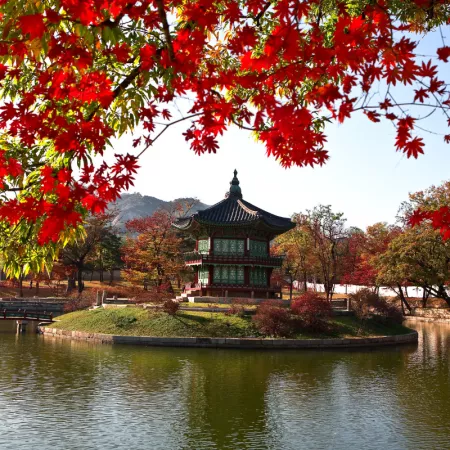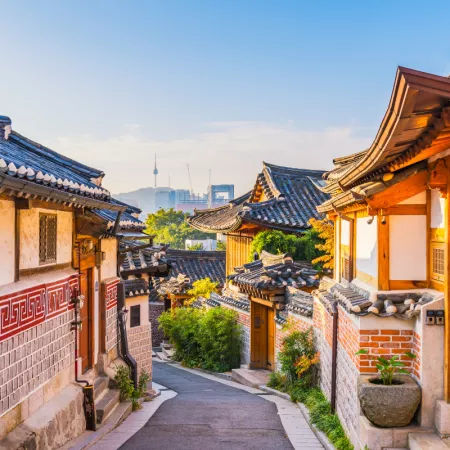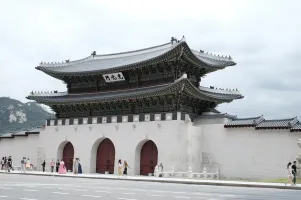
South Korea
Duration
7 to 14 Days
7 to 14 Days
Best time to visit
Apr-May, Sep-Oct
Apr-May, Sep-Oct
Theme
Hill Station, Adventure, Heritage
Hill Station, Adventure, Heritage
South Korea Travel Guide
South Korea, located in East Asia, is a country known for its rich history, stunning landscapes, and vibrant culture. From ancient temples to modern skyscrapers, South Korea offers a unique blend of tradition and innovation. The country is famous for its delicious cuisine, K-pop music, and cutting-edge technology.Top Attractions in South Korea
1. Visit the historic Gyeongbokgung Palace in Seoul 2. Explore the beautiful Jeju Island 3. Hike along the scenic trails of Seoraksan National Park 4. Experience the bustling street markets of Busan 5. Discover traditional Korean villages in AndongSouth Korea is Famous for
South Korea is most famous for its delicious cuisine, including dishes like kimchi, bulgogi, and bibimbap.Top Attractions in South Korea
- Visit the historic Gyeongbokgung Palace in Seoul - Explore the beautiful Jeju Island - Hike along the scenic trails of Seoraksan National Park - Experience the bustling street markets of Busan - Discover traditional Korean villages in AndongWhat's Great about Travelling to South Korea?
- Experience a unique blend of tradition and modernity - Enjoy delicious Korean cuisine - Explore stunning natural landscapes - Discover vibrant cities like Seoul and BusanWhat's Not So Great about Travelling to South Korea?
- Language barrier for non-Korean speakers - Crowded tourist spots during peak seasons - Limited vegetarian food optionsTravel Tips for South Korea
- Check visa requirements before traveling - Use public transportation like buses and subways - Stay aware of cultural customs and etiquette - Keep emergency numbers handyImportant South Korea trip information
- Ideal Duration: A minimum of 7-10 days to explore major attractions.
- Best Time to Visit: Spring (April to June) and Autumn (September to November) for pleasant weather.
- Nearby Airports and Railway Stations: Incheon International Airport in Seoul and Seoul Station for railways.
Top 2 Places to visit in South Korea
Per Person
51,599
*EXCLUDING APPLICABLE TAXES 5.0 Ratings
( 26 Reviews )
( 26 Reviews )
Per Person
1,29,175
*EXCLUDING APPLICABLE TAXES 5.0 Ratings
( 393 Reviews )
( 393 Reviews )
Per Person
3,50,000
*EXCLUDING APPLICABLE TAXES Per Person
4,30,000
*EXCLUDING APPLICABLE TAXES Per Person
3,50,000
*EXCLUDING APPLICABLE TAXES 5.0 Ratings
( 79 Reviews )
( 79 Reviews )
Per Person
1,38,008
*EXCLUDING APPLICABLE TAXES 5.0 Ratings
( 393 Reviews )
( 393 Reviews )
FAQ's on South Korea
Q1: What is the best time to visit South Korea?
The best time to visit South Korea is during the spring months of April and May or the autumn months of September and October. These seasons offer mild temperatures, beautiful cherry blossoms in spring, and stunning foliage in autumn. Summer can be hot and humid, while winter can be very cold with the possibility of heavy snowfall. Consider visiting during the spring or autumn for comfortable weather and to enjoy popular festivals like the cherry blossom festivals or the colorful autumn foliage.
Q2: Do I need a visa to travel to South Korea?
Most visitors to South Korea do not need a visa for short visits of up to 90 days for tourism or business purposes. However, visa requirements may vary based on your nationality, so it's important to check with the South Korean embassy or consulate in your country before your trip. Some countries are eligible for visa exemption or visa on arrival. Make sure your passport has at least six months validity from your planned date of departure and that you have proof of sufficient funds for your stay.
Q3: What are the must-visit attractions in South Korea?
South Korea offers a mix of traditional culture and modern attractions. Must-visit places include the vibrant capital city of Seoul with iconic landmarks like Gyeongbokgung Palace and N Seoul Tower, the historic city of Gyeongju known for its ancient temples and burial mounds, the stunning volcanic island of Jeju with its natural beauty, and the Demilitarized Zone (DMZ) for a unique glimpse into North Korea. Don't miss trying traditional Korean cuisine, exploring bustling markets, and experiencing the country's rich history and culture through museums and performances.
Q4: Is South Korea a safe place to travel?
South Korea is generally considered a safe country for travelers. The crime rate is low, and the locals are known for their hospitality. However, like any destination, it's important to stay vigilant, especially in crowded tourist areas where petty theft can occur. Be cautious late at night, avoid confrontations, and follow basic safety precautions. It's advisable to have travel insurance that covers medical expenses and emergencies. Always carry identification with you and keep your belongings secure to ensure a safe and enjoyable trip.
Q5: What is the local currency in South Korea and can I use credit cards?
The local currency in South Korea is the South Korean Won (KRW). While credit cards are widely accepted in major establishments and cities, it's advisable to carry some cash, especially in smaller shops or markets. ATMs are readily available, and major credit cards like Visa and Mastercard are commonly accepted. It's a good idea to inform your bank of your travel plans to avoid any issues with card usage. Currency exchange services are available at airports, banks, and hotels, but it's recommended to compare rates for the best deal.
Q6: What is the local cuisine like in South Korea?
South Korean cuisine is diverse, flavorful, and known for its emphasis on fresh ingredients and unique flavors. Some popular dishes include kimchi (fermented vegetables), bulgogi (marinated grilled beef), bibimbap (mixed rice bowl with vegetables and meat), and samgyeopsal (grilled pork belly). Korean barbecue is a must-try experience where you can grill your own meat at the table. Seafood dishes are also plentiful, thanks to South Korea's coastal location. Vegetarians will find options like vegetable bibimbap or tofu stew. Don't forget to try traditional Korean teas and desserts like bingsu (shaved ice) and hotteok (sweet pancakes) for a complete culinary experience.
Q7: What transportation options are available in South Korea?
South Korea has a well-developed transportation system that makes it easy to travel within the country. The most convenient way to get around is by using the extensive subway and bus networks in major cities like Seoul and Busan. Trains are also a popular choice for traveling between cities, with high-speed KTX trains connecting major destinations quickly and efficiently. Taxis are readily available, but they can be more expensive than public transport. Rental cars are an option for those looking for more flexibility, although traffic in cities can be congested. South Korea also has a reliable intercity bus system that covers most parts of the country, making it easy to explore different regions.
Q8: Are there any cultural norms or etiquette I should be aware of when visiting South Korea?
When visiting South Korea, it's important to be aware of and respect the local customs and etiquette. Bowing is a common form of greeting, with a deeper bow showing more respect. Remove your shoes when entering someone's home or certain traditional establishments like temples. Refrain from displaying public affection, speaking loudly in public places, or pointing with your fingers. It's polite to accept gifts with both hands and to reciprocate the gesture. When dining, wait for the eldest person to start eating before you begin. Tipping is not customary in South Korea, and it's considered polite to finish all the food on your plate. By being mindful of these cultural norms, you can show respect for the local traditions and make a positive impression during your visit.
Q9: I am a travel agent. How can I buy travel leads of South Korea?
Register yourself as a travel agent at agents.tripclap.com and then you can buy travel leads to South Korea once your account is approved. For more details contact our support team at +91-8069186564 or support@tripclap.com







